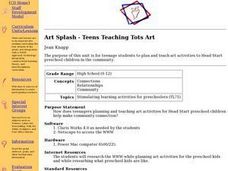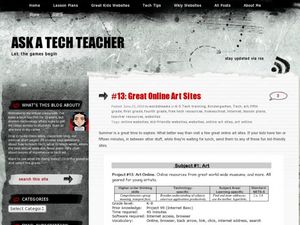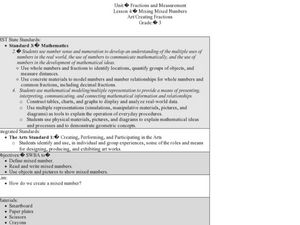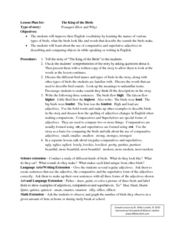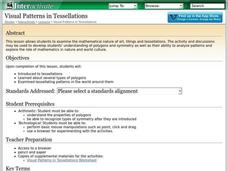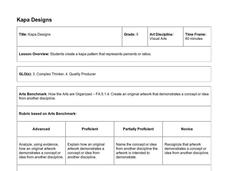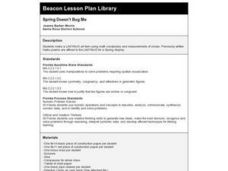Curated OER
Patterns, Patterns, Patterns
Create geometric art in your classroom. Learners use a ruler to mark lines on their paper, they then trace a lid to create a series of circles. They color in each circle using two tones or colors to create an interesting visual...
Curated OER
Teens Teaching Tots Art
Young scholars plan and teach art activities to Head Start preschool students in the community. Young scholars research the WWW while planning art activities for the preschool kids and while researching what preschool kids are...
Curated OER
Finding Math In The World Of Art
Students explore the use of Math in the world of Art. In this mathematics and visual art lesson, they design a picture using math digits that are camouflaged into a pictures. Additional cross curriculum activities are embedded in the plan.
Curated OER
Colored Sand Art
Students trace images on paper with glue and then sprinkle on colored sand they have made to create sand art pictures.
Curated OER
Great Online Art Sites
Learners complete an online study of art websites. In this art and technology lesson, students explore the links and try the activities to learn about art online.
Orange Public Schools
Stagecraft
The house lights dim, the curtain parts, lights slowly come up, revealing the stage. Before the actors appear, before a word is spoken, the audience is drawn in by the lighting, by the colors, by lines of the set, by the props, and...
Curated OER
Mixing Mixed Numbers Art/Creating Fractions
Third graders explore number values by participating in class math activities. In this fractions lesson, 3rd graders collaborate with classmates to discuss the technique of adding mix numbers while utilizing paper plates to help...
Curated OER
Numbers in Art
Students choose a number from one to twelve and tell a number story about it. They listen to the teacher read "Numbers in Art" by Lucy Micklethwait. Students choose three numbers from one to twelve and view works of art while looking for...
Curated OER
Money and Business (Art)
Third graders investigate world currency by creating their own coin art. In this government lesson plan, 3rd graders examine the characteristics of different coins and create their own design for a new one. Students discuss...
Curated OER
What do two-dimensional tessellations look like? Where in art can they be found?
Students explore the world of art and culture, including the works of M.C. Escher. They identify and create original tessellations. Students use a wealth of interactive multimedia applications. They explore the artistic representations...
Curated OER
Geometry in Art
Students recognize and measure geometric shapes within abstract art. They examine quilts for shapes and they each make their own quilt from squares using geometry and measurement.
Curated OER
Using Art to Draw Us Together
Students build their own bridges or make connections to other peers, teens, adults/parents, senior citizens and people from around the world through various art mediums. Through this type of lesson students attempt to communicate in...
Curated OER
Shapes and Patterns in Art and Oceans
First graders draw, cut out, and design their own fish shapes by cutting out shapes and putting them together. In this shapes and patterns worksheet, 1st graders also construct a stamp and print patterns with stamps to repeat a...
Curated OER
Plaster Sculpture – subtractive method
Practice the subtractive sculpture process with your class. They'll discuss the subtractive method, art form and space, then design a sculpture which they will create from a block of plaster. Technical instructions are included.
Curated OER
The King of the Birds vocabulary
Science and language skills come together in The King of the Birds. After reading, discuss the names and types of birds in the story and write given sentences to portray the difference between comparative and superlative adjectives....
Curated OER
Sculpture in Balance
Students discuss the difference betwen two-dimensional vs. three-dimensional art. In this art lesson, students discuss what symmetry or balance is in art and construct a symmetrical and an asymmetrical mobile.
Shodor Education Foundation
Visual Patterns in Tessellations
Geometers explore the concept of tessellations. They use a tessellation applet to manipulate shapes and design their own tessellation using the applet.
Hawaiʻi State Department of Education
Kapa Designs
I always knew there was a connection between art and math, and this instructional activity proves it. Fifth graders will use what they know about ratios and percents to design art inspired by Polynesian kapa cloth. A grid, specific...
Hawaiʻi State Department of Education
Angles on Kandinsky
Not only is Wassily Kandinsky fun to say, his art contains tons of angles. Learners discuss Kandinsky's music-inspired abstract art and four types of angles. They search one of his paintings for obtuse, right, straight, and acute angles,...
Intel
Choreographing Math
Leaners investigate families of linear functions through dance. They choreograph dance moves to model nine unique linear functions of their choosing. Using their dance moves, teams create a video presentation complete with music and...
Curated OER
Spring Doesn't Bug Me
Pupils make a ladybug art item using math vocabulary and measurements of circles. Ladybugs are made using a compass. Once the bug is complete, attach a previously-written Haiku to it.
Manitoba Education and Early Childhood Learning
A Foundation for Implementation
Color is the focus of this amazing resource packed with math, social studies, science, and language arts activities. Kids create a color word wall and post symbols, graph the number of objects they find of each color while on a...
Curated OER
The Human Body
Explore the human body through hands-on activities. Young learners will trace their bodies and place cut out body organs in the proper place, print patterns using cut fruit, sing songs about good nutrition, and use their five senses...
Hawaiʻi State Department of Education
Mask Symmetry
When you engage learners in creating symmetrical objects you are also building their vocabulary and math sense. Kids discuss key words such as, asymmetrical, symmetrical, balance, tint, and shade. They use these elements of design to...



